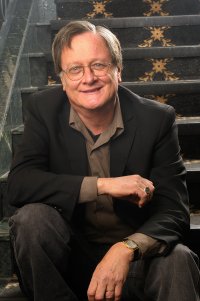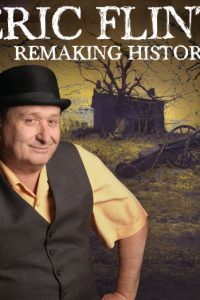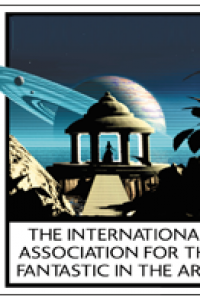Tim Powers: An Unexpected Direction
 Timothy Thomas Powers was born in Buffalo NY on February 29, 1952 (he only gets a birthday during leap years). He moved with his family to Southern California when he was seven and has lived there ever since. He attended California State University Fullerton, graduating with a BA in English in 1976. While in college he became friends with James P. Blaylock and K.W. Jeter, and all three spent time with Philip K. Dick, who influenced their writing and careers in various ways. In college Powers co-created fictional poet William Ashbless, who first appeared as the author of a poem Powers and Blaylock collaborated on, each adding one line at a time. Ashbless has since written introductions to (and harsh critiques of) each writer’s work, and has authored various pamphlets, as well as featuring in The William Ashbless Memorial Cookbook (2001).
Timothy Thomas Powers was born in Buffalo NY on February 29, 1952 (he only gets a birthday during leap years). He moved with his family to Southern California when he was seven and has lived there ever since. He attended California State University Fullerton, graduating with a BA in English in 1976. While in college he became friends with James P. Blaylock and K.W. Jeter, and all three spent time with Philip K. Dick, who influenced their writing and careers in various ways. In college Powers co-created fictional poet William Ashbless, who first appeared as the author of a poem Powers and Blaylock collaborated on, each adding one line at a time. Ashbless has since written introductions to (and harsh critiques of) each writer’s work, and has authored various pamphlets, as well as featuring in The William Ashbless Memorial Cookbook (2001).
Powers has written some science fiction, but more often his work involves the supernatural and magic, with an emphasis on mythology and secret histories of historical figures, including Bugsy Siegel, Lord Byron, Thomas Edison, Albert Einstein, Charlie Chaplin, and, most recently, the Rossetti siblings. His first two novels were SF: The Skies Discrowned (1976; revised as Forsake the Sky 1986) and Epitaph in Rust (1976; revised as An Epitaph in Rust 1989). Fantasy The Drawing of the Dark appeared in 1979. Time-travel novel The Anubis Gates (1983) and post-holocaust SF Dinner at Deviant’s Palace (1985) each won a Philip K. Dick Memorial Award. On Stranger Tides (1987) involves pirates and voodoo, and The Stress of Her Regard (1989) concerns the supernatural exploits of poets Byron, Shelley, and Keats. Contemporary fantasy Last Call (1992) won a World Fantasy Award and a Locus Award, and began a loose trilogy that also includes Expiration Date (1995) and Earthquake Weather (1997), both Locus Award winners. Declare (2001), a supernatural secret history about Cold War spies, won a World Fantasy Award and an International Horror Guild Award. Three Days to Never (2006) involves time travel, supernatural creatures, and the secret histories of Albert Einstein and Charlie Chaplin. He returned to the world of The Stress of Her Regard with his latest novel Hide Me Among the Graves (2012), this time with a focus on painter Dante Gabriel Rossetti and his sister, the poet Christina Rossetti.
Powers has produced a small but exceptional body of short fiction, most collected in Night Moves and Other Stories (2001), Strange Itineraries (2004), and The Bible Repairman and Other Stories (2011). Some stories have been published as standalone books, including Night Moves (1986), Where They Are Hid (1995), The Bible Repairman (2005), A Soul in a Bottle (2006), and Salvage and Demolition (2012). Collection The Devils in the Details (2003) features a story by Powers, a story by James P. Blaylock, and a collaboration.
He lives in San Bernardino CA with his wife Serena (married 1980).
‘‘With Hide Me Among the Graves, I didn’t deliberately set out to write a sequel to The Stress of Her Regard, which had been published more than 20 years earlier. I was snagged by reading somewhere that when Dante Gabriel Rosetti’s wife committed suicide, and he blamed himself and was all torn up about it, he took his notebook of poetry and laid it into her coffin, and she was buried with all his poetry. Everybody admired this gesture of extreme grief. Several years later, though, a publisher said, ‘You know, if you had a collection of poetry we could publish a book.’  And Rossetti said, ‘Ah, give me a couple of days,’ and he dug her up and retrieved the manuscript. My first thought on reading that was, ‘Oh yeah? Why did he really dig her up?’ Plainly he either needed to get something else out of the coffin, or he needed to put something else into it. That was an obvious event to use as the kernel of a fantasy novel, and so I began reading very obsessively about him and his sister Christina Rossetti and their siblings and all their various associates. I discovered that John Polidori was their maternal uncle, and Polidori had been a character in The Stress of Her Regard. Then I discovered that Edward John Trelawny, a sort of piratical figure who knew Byron and Shelley and who arranged Shelley’s funeral pyre – and who also had been a character in my older book – knew the Rossetti siblings. He was in his eighties by that time, but still a very important character. For instance, William Rossetti’s children always died in infancy, and Trelawny gave him a piece of Shelley’s charred jaw bone which he had saved as a souvenir from the funeral pyre 50 years earlier, and immediately William was able to have children that lived. This was all true!”
And Rossetti said, ‘Ah, give me a couple of days,’ and he dug her up and retrieved the manuscript. My first thought on reading that was, ‘Oh yeah? Why did he really dig her up?’ Plainly he either needed to get something else out of the coffin, or he needed to put something else into it. That was an obvious event to use as the kernel of a fantasy novel, and so I began reading very obsessively about him and his sister Christina Rossetti and their siblings and all their various associates. I discovered that John Polidori was their maternal uncle, and Polidori had been a character in The Stress of Her Regard. Then I discovered that Edward John Trelawny, a sort of piratical figure who knew Byron and Shelley and who arranged Shelley’s funeral pyre – and who also had been a character in my older book – knew the Rossetti siblings. He was in his eighties by that time, but still a very important character. For instance, William Rossetti’s children always died in infancy, and Trelawny gave him a piece of Shelley’s charred jaw bone which he had saved as a souvenir from the funeral pyre 50 years earlier, and immediately William was able to have children that lived. This was all true!”
…
‘‘My approach is to assume that nothing in history is a coincidence – if any two things happen at the same time, then there is a connection – and to ask myself, ‘What were they up to really?’ If history says a person was in a particular place to meet somebody, or attend a funeral, or get married, you look for little details and you’ll find he threw a cigar into someone’s drink, maybe, and so you find out whose drink it was, what he was drinking, did either of them have any false limbs or a glass eye, what phase the moon was in, everything. And if you’re obsessively looking for evidence of some supernatural context, you’ll generally find something. I let the pieces of the plot suggest themselves – I connect the dots, but the dots present themselves. My system of writing is really designed for someone with no intrinsic imagination (though I suppose it does take imagination to know what is a suggestive dot and what is useless trivia).”
…
‘‘Luckily I don’t keep up with current SF and fantasy. Up until 1975 I read virtually everything, but now I don’t really know what’s being written about – case in point – vampires. I get the idea that current vampires are metrosexual guys who are kind of perversely charming. I certainly prefer the kind of vampires like Dracula – they’re more fun because the metrosexual with nice hair is going to be too much like a human character, one who probably reads the same blogs and magazines as everybody else, and probably goes to Starbucks. I want an inhuman species that will be alarmingly and disorientingly alien. I want them to only peripherally overlap with humans, so that humans can’t comprehend their emotions or their thoughts. The vampires can’t really understand very much about us, either, but to our misfortune there is an overlap. That’s more interesting to write about. Vampires shouldn’t tweet.”
…
‘‘The next novel looks likely to involve Los Angeles and Hollywood, and it will be pretty much contemporary. It involves consequences from things that happened in the ’20s and ’30s – how can you not have consequences from the ’20s and ’30s? One nice thing about the history of Hollywood and LA is, you can comprehend it. The city itself only goes so far back. If you go back to 1890, you have pretty much encompassed all the history of LA, unlike London or Rome where you have to go back thousands of years before you’ve seen everything. I find Hollywood totally fascinating. LA is my favorite city. Some people are baffled by that – they’ll say, San Francisco, New Orleans. But it only takes ten minutes to fall in love with San Francisco. You have to hang around LA and take some wrong turns and funny off-ramps and get to know it for a while before its charms become evident. The Hollywood area especially is so full of mythology and extravagance and doubtful stories, apocryphal stories that may be hugely important or might be smoke, and lots of them involve physical places that are still there – you can go stand there and look around. You can see the secret black Madonna embedded in a wall, which is only visible if you stand in a particular place across the street. What’s the story on that, really? There are stairways that let you skip long roundabout roads and climb right over a hill into an adjoining valley, and I swear you can’t get to some of those valleys except via those stairways. Weird temples in the hills, forgotten tunnels, abandoned Nike missile bases! I find Hollywood endlessly full of implications, and stories, and colorful history, all lending themselves to fantasy. We live only an hour away and research is a great excuse to go there and climb up and down the hills and spend an hour in a bar where Orson Welles threw up, or see where F. Scott Fitzgerald fell down dead. The place is full of the suggestive details that I use in lieu of imagination. The details of Hollywood are likely to be florid and sensational and full of exaggerated drama, as opposed to the history of Akron OH, which I’m sure is not less important but probably has less flamboyance and is less obsessively documented, photographed, and filmed.”
…
I never have any points to make in a book or story beyond the events of the story itself. I never feel that I am making a statement about anything. If a writer consciously has some external point to make, the characters and events are too likely to become metaphors for something, and the story generally collapses entirely. Because suddenly they’re not real starships, they’re actually American imperialism or something. I want them to be real starships. There are exceptions to this, of course. 1984 is exactly what I’m saying I don’t approve of, but it’s a great book because Orwell made it so aggressively tangible, smellable, and palpable. The whole point of our stuff – our starships and time machines and ghosts – is disorientation and vertigo. You want the reader to be suddenly tilted into an unexpected direction, to have an experience they can’t possibly have in real life. When I read this stuff, I want to be walking through an Escher print or a Bosch landscape. I want that experience to be totally presented as real. I don’t want any hint that the writer is actually talking about the Catholic Church, or George Bush, or the size of soft-drink cups in New York.



 Excerpts from the interview:
Excerpts from the interview:


